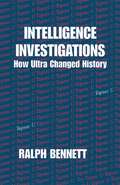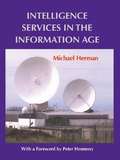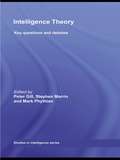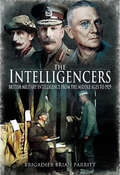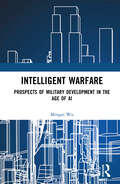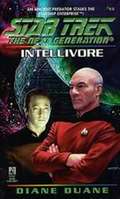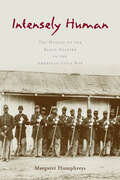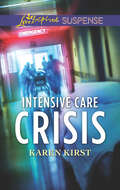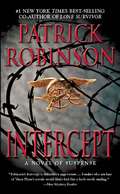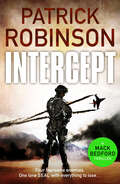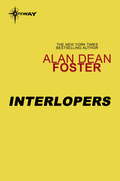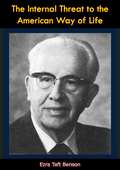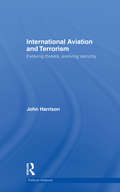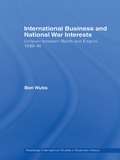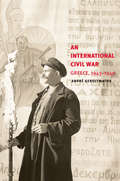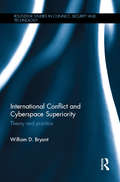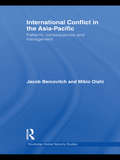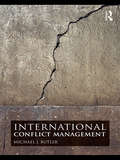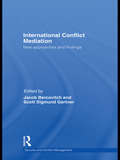- Table View
- List View
Intelligence Investigations: How Ultra Changed History (Studies in Intelligence)
by Ralph BennettMilitary intelligence, grossly neglected during the interwar period, had by mid-1942 proved itself indispensable through information gathered from intercepted radio messages in the supposedly unbreakable German Enigma cipher. Ralph Bennett, who worked for four years at Bletchley Park as a senior producer of the intelligence (Ultra') derived from the Enigma decrypts, illustrates in this collection of reprinted essays some of the steps by which he and others developed the new type of information and in the process a candid glimpse of the workings of British intelligence both past and present.
Intelligence Services in the Information Age (Studies In Intelligence Ser.)
by Michael HermanIntelligence was a central element of the Cold War and the need for it was expected to diminish after the USSR's collapse, yet in recent years it has been in greater demand than ever. The atrocities of 11 September and the subsequent "war on terrorism" now call for an even more intensive effort. Important questions arise on how intelligence fits into the world of increased threats, globalization and expanded international action. This volume contains the recent work on this subject by Michael Herman, British intelligence professional for 35 years and Oxford University academic. It compares intelligence with other government information services, and discusses the British intelligence system and the case for its reform. It also addresses the ethical issues raised by intelligence's methods and results: "do they on balance make for a better world or a worse one?". Other chapters explore a wide range of intelligence topics past and present, including the transatlantic relationship, the alliance strategies of Norway and New Zealand, Mrs Thatcher's "de-unionization" of British Sigint, and personal memories of the British Cabinet Office in the 1970s.Michael Herman argues for intelligence professionalism as a contribution to international security and for its encouragement as a world standard. The modern challenge is for intelligence to support international cooperation in ways originally developed to advance national interests, while at the same time developing some restraint and international "rules of the game", in the use of intrusive and covert methods on its traditional targets. The effects of 11 September on this challenge are discussed in a thoughtful afterword.
Intelligence Theory: Key Questions and Debates
by Peter Gill Stephen Marrin Mark PhythianThis edited volume brings together a range of essays by individuals who are centrally involved in the debate about the role and utility of theory in intelligence studies. The volume includes both classic essays and new articles that critically analyse some key issues: strategic intelligence, the place of international relations theory, theories of
The Intelligencers: British Military Intelligence From the Middle Ages to 1929
by Brian ParrittIntelligence about the enemy is a fundamental part of any war or battle; knowledge of the enemys strength, dispositions and intentions are essential for success. This book reveals that for 250 years the British Army resolutely failed to prepare for war by refusing to establish a nucleus of soldiers in peace, trained to obtain intelligence in war. Although there were Scoutmasters and secret spy organizations such as Walsinghams in the 15th Century, in no major conflict from the Civil War of 1642, including the Peninsula, the Crimea, Burma, Egypt and South Africa and in the multitude of small wars that gained Britain an empire, was there any staff branch or unit specifically pre-established to gain intelligence or frustrate the enemy from obtaining intelligence. Yet the story of British military endeavor over 250 years is a remarkable story of individuals bravery, achievement and success. We read of the Scoutmaster whose role was to gather intelligence on the Kings enemies and of Walsinghams secret organization at the time of Elizabeth I. During the long years of war against France culminating in the Napoleonic Wars, spy masters developed on an ad hoc basis. In the Nineteenth Century, despite the power and reach of Empire, no central intelligence organization existed. Enterprising young officers worked wonders but failures such as those in the Boer War cost the Nation dearly. It took the reverses in the Great War to create an Intelligence Corps. But even that was disbanded postwar.
Intelligent Warfare: Prospects of Military Development in the Age of AI
by Mingxi WuThis book examines the future trend toward "intelligent" warfare considering the global environment, the history of warfare, and scientific and technological advancement. It develops a comprehensive set of theoretical frameworks, application concepts, and evaluation criteria for military intelligence.The volume is packed with theoretical highlights and vivid examples, including the tracking of Osama bin Laden, the decapitation strike against Qasem Soleimani, the remote assassination of Iranian nuclear scientists, the drone war in the Nagorno–Karabakh conflict, modern equipment deployed in the Palestinian–Israeli conflict, and the war between social media groups. In addition, the author envisions a possible future for "intelligent" wars in which adversarial parties engage in combat through virtual and unmanned systems. This nature may help avoid the brutality and high death toll associated with traditional warfare.The book explores the possibility of future civilized warfare. It will be of interest to researchers, academics, and students in the fields of politics, military intelligence, and military technology, and to those who are interested in intelligent warfare in general.
Intellivore (Cold Equations #45)
by Diane DuaneThe Great Rift lies between the Sagitarius and Orion arms of the galaxy. Stars are scarce there, beyond the authority of the Federation, and legends abound of lost civilizations and of ancient monsters that prey on those who dare to venture into the vast darkness between the stars. When several ships and colonies mysteriously disappear into the Rift, the U.S.S. Enterprise leads an expedition to investigate various disturbing reports. Accompanied by two other Federation starships, Picard and his fellow captains discover a bizarre menace of unimaginable power. And the only way to trap this destructive entity is to use the Enterprise as bait.
Intensely Human: The Health of the Black Soldier in the American Civil War
by Margaret HumphreysBlack soldiers in the American Civil War were far more likely to die of disease than were white soldiers. In Intensely Human, historian Margaret Humphreys explores why this uneven mortality occurred and how it was interpreted at the time. In doing so, she uncovers the perspectives of mid-nineteenth-century physicians and others who were eager to implicate the so-called innate inferiority of the black body. In the archival collections of the U.S. Sanitary Commission, Humphreys found evidence that the high death rate among black soldiers resulted from malnourishment, inadequate shelter and clothing, inferior medical attention, and assignments to hazardous environments. While some observant physicians of the day attributed the black soldiers' high mortality rate to these circumstances, few medical professionals—on either side of the conflict—were prepared to challenge the "biological evidence" of white superiority. Humphreys shows how, despite sympathetic and responsible physicians' efforts to expose the truth, the stereotype of black biological inferiority prevailed during the war and after.
Intensive Care Crisis (Mills And Boon Love Inspired Suspense Ser.)
by Karen KirstRunning low on faith, a marine finds hope in the nurse he has vowed to protect in this romantic suspense thriller from the author of Explosive Reunion.She uncovered a secret someone will kill for . . . But he’s determined she’ll surviveReporting missing narcotics lands nurse Audrey Harris and her patients in the crosshairs of a ruthless thief. But when marine sergeant Julian Tan is one of the patients in danger, the criminals unwittingly provide her with a strong—and handsome—protector. On the run, Julian and Audrey must stop a crime boss . . . or become the next to fall.
Intercept
by Patrick RobinsonA left-leaning appeal court judge liberates four of the most dangerous al-Qaeda terrorists from Guantanamo Bay and the CIA field officers track them back to Pakistan's northwest frontier mountain range. But disaster overtakes them and the four men vanish, to rejoin the dark and mysterious forces trained by Osama bin Laden high in the Hindu Kush. These are men with hatred in their hearts, with hatred for the United States and Great Britain, and they are sworn to hit back at the USA, which imprisoned so many of their high command.A fateful communication from the mountains of the Afghan side of the border is intercepted by Britain's secret surveillance station on the Mediterranean island of Cyprus. Al-Qaeda is almost certainly planning a new hit on the US mainland. The CIA is at its wits end, all their fears coming home to roost.They know there is only one man who can stop them-retired Navy SEAL Lt. Commander Mack Bedford-and he is called in to assist on one of the most highly classified missions ever launched from CIA headquarters. Bedford names his price, and once more, the nobility of the man is spun into a breathtakingly fast action novel.
Intercept (The Mack Bedford Military Thrillers)
by Patrick RobinsonAn ex–Navy SEAL joins a top-secret mission to halt a deadly terrorist attack in this military thriller by a #1 New York Times–bestselling author. An appeal court judge frees four of the world's most dangerous terrorists from Guantanamo Bay. The CIA tracks them back to Pakistan&’s North-West Frontier, but then the men vanish. Fortunately, a communication from the Afghan side of the border is intercepted by Britain&’s secret surveillance station in Cyprus. Al-Qaeda is plotting a devastating attack. The CIA panics, its greatest fears realized. Retired Navy SEAL Mack Bedford is called in to assist one of the most highly classified missions ever launched from CIA headquarters, with the stakes higher than ever before . . . A breathtaking and unputdownable action thriller, Intercept is ideal for fans of James Phelan and Chris Ryan.Praise for the writing of Patrick Robinson &“One of the crown princes of the beach-read thriller.&” —Stephen Coonts, New York Times–bestselling author of The Disciple&“Patrick Robinson has tapped into our fear.&” —Torquay Herald Express &“Robinson [crafts] a fast-paced, chilling, yet believable tale.&” —San Francisco Examiner
Intercept
by Patrick RobinsonA left-leaning appeal court judge liberates four of the most dangerous al-Qaeda terrorists from Guantanamo Bay and the CIA field officers track them back to Pakistan’s northwest frontier mountain range. But disaster overtakes them and the four men vanish, to rejoin the dark and mysterious forces trained by Osama bin Laden high in the Hindu Kush. These are men with hatred in their hearts, with hatred for the United States and Great Britain, and they are sworn to hit back at the USA, which imprisoned so many of their high command. A fateful communication from the mountains of the Afghan side of the border is intercepted by Britain’s secret surveillance station on the Mediterranean island of Cyprus. Al-Qaeda is almost certainly planning a new hit on the US mainland. The CIA is at its wits end, all their fears coming home to roost. They know there is only one man who can stop them-retired Navy SEAL Lt. Commander Mack Bedford-and he is called in to assist on one of the most highly classified missions ever launched from CIA headquarters. Bedford names his price, and once more, the nobility of the man is spun into a breathtakingly fast action novel.
Intercept
by Patrick RobinsonA left-leaning appeal court judge liberates four of the most dangerous al-Qaeda terrorists from Guantanamo Bay and the CIA field officers track them back to Pakistan's northwest frontier mountain range. But disaster overtakes them and the four men vanish, to rejoin the dark and mysterious forces trained by Osama bin Laden high in the Hindu Kush. These are men with hatred in their hearts, with hatred for the United States and Great Britain, and they are sworn to hit back at the USA, which imprisoned so many of their high command.A fateful communication from the mountains of the Afghan side of the border is intercepted by Britain's secret surveillance station on the Mediterranean island of Cyprus. Al-Qaeda is almost certainly planning a new hit on the US mainland. The CIA is at its wits end, all their fears coming home to roost.They know there is only one man who can stop them-retired Navy SEAL Lt. Commander Mack Bedford-and he is called in to assist on one of the most highly classified missions ever launched from CIA headquarters. Bedford names his price, and once more, the nobility of the man is spun into a breathtakingly fast action novel.
Intercept
by Patrick RobinsonA left-leaning appeal court judge liberates four of the most dangerous al-Qaeda terrorists from Guantanamo Bay and the CIA field officers track them back to Pakistan's northwest frontier mountain range. But disaster overtakes them and the four men vanish, to rejoin the dark and mysterious forces trained by Osama bin Laden high in the Hindu Kush. These are men with hatred in their hearts, with hatred for the United States and Great Britain, and they are sworn to hit back at the USA, which imprisoned so many of their high command.A fateful communication from the mountains of the Afghan side of the border is intercepted by Britain's secret surveillance station on the Mediterranean island of Cyprus. Al-Qaeda is almost certainly planning a new hit on the US mainland. The CIA is at its wits end, all their fears coming home to roost.They know there is only one man who can stop them-retired Navy SEAL Lt. Commander Mack Bedford-and he is called in to assist on one of the most highly classified missions ever launched from CIA headquarters. Bedford names his price, and once more, the nobility of the man is spun into a breathtakingly fast action novel.
Interlopers
by Alan Dean FosterUpset stomachs. The collapse of civilizations. Nervous breakdowns.Blame them on a twist of fate, but archaeologist Cody Westcott knows differently. Something is causing these random acts of badness. Something ancient, something evil, something...hungry.We are not alone, but we're about to wish we were...Interlopers.
The Internal Threat to the American Way of Life
by Ezra Taft BensonThe Internal Threat to the American Way of Life was a talk given by Ezra Taft Benson at the Shrine Auditorium in Los Angeles, California on December 11, 1961. Benson had served as the 15th United States Secretary of Agriculture from January 21, 1953 to January 20, 1961.
International Aviation and Terrorism: Evolving Threats, Evolving Security (Political Violence)
by John HarrisonThis book examines terrorism's impact on the international aviation security regime, with a focus on the role of the United States. Tracing the historical development of the international civil aviation system, the volume examines how it has dealt with the evolving security environment caused by international terrorism. It begins by exploring the practical implications of the debates over the meaning of 'terrorism' and how the international civil aviation community developed practical solutions to avoid the debilitating debates over the concept while crafting important, if weak, international conventions. As a major civil aviation power, the United States was a predominant influence in security developments in the 1960s and 1970s, yet US civil aviation policy failed to keep pace with the changing nature of the terrorist threat. The commanding position that the United States maintains in international civil aviation provides a microcosm of the promise and perils faced by the world's sole superpower. The author examines US efforts to upgrade civil aviation security in the wake of 9/11 and the impacts of these developments on the international civil aviation system. The detailed discussion of terrorism past and present places the threat in its proper context for both the international civil aviation community and its largest individual actor, the United States. This book will be of much interest to students of terrorism, aviation security, international security and IR in general. John Harrison is an Assistant Professor at the S.Rajaratnam School of International Studies and Head of Terrorism Research at the International Center for Political Violence and Terrorism Research.
International Business and National War Interests: Unilever between Reich and empire, 1939-45 (Routledge International Studies In Business History Ser.)
by Ben WubsThis book deals with the activities of the Anglo-Dutch multinational during the war. Given the various threats faced by Unilever during the Nazi period, Ben Wubs argues that it was not self evident that the company would survive the war. Based on research into company sources which were hitherto unavailable, he shows the effect of the war on Unilev
An International Civil War: Greece, 1943-1949
by André GerolymatosAn authoritative history of the Greek Civil War and its profound influence on American foreign policy and the post–Second World War period In his comprehensive history André Gerolymatos demonstrates how the Greek Civil War played a pivotal role in the shaping of policy and politics in post–Second World War Europe and America and was a key starting point of the Cold War. Based in part on recently declassified documents from Greece, the United States, and the British Intelligence Services, this masterful study sheds new light on the aftershocks that have rocked Greece in the seven decades following the end of the bitter hostilities.
International Conflict and Cyberspace Superiority: Theory and Practice (Routledge Studies in Conflict, Security and Technology)
by William D. BryantThis book examines cyberspace superiority in nation-state conflict from both a theoretical and a practical perspective. This volume analyses superiority concepts from the domains of land, maritime, and air to build a model that can be applied to cyberspace. Eight different cyberspace conflicts between nation states are examined and the resulting analysis is combined with theoretical concepts to present the reader with a conclusion. Case studies include the conflict between Russia and Estonia (2007), North Korea and the US and South Korea (2009) and Saudi Arabia and Iran in the Aramco attack (2012). The book uses these case studies to examine cyberspace superiority as an analytical framework to understand conflict in this domain between nation-states. Furthermore, the book makes the important distinction between local and universal domain superiority, and presents a unique model to relate this superiority in all domains, as well as a more detailed model of local superiority in cyberspace. Through examining the eight case studies, the book develops a rigorous system to measure the amount of cyberspace superiority achieved by a combatant in a conflict, and seeks to reveal if cyberspace superiority proves to be a significant advantage for military operations at the tactical, operational, and strategic levels. This book will be of much interest to students of cyber-conflict, strategic studies, national security, foreign policy and IR in general.
International Conflict in the Asia-Pacific: Patterns, Consequences and Management (Routledge Global Security Studies)
by Jacob Bercovitch Mikio OishiThis book analyses four major long-standing and intractable conflicts in the Asia-Pacific region (the Korean Peninsula; the Taiwan Strait; the South China Sea (Spratly Islands); and India-Pakistan), and aims to identify the mechanisms used to manage these conflicts. International Conflict in the Asia-Pacific brings together in one volume four major international conflicts that have shaped the region, and studies how they evolved and how best to manage them. The book seeks to find a pattern common to the four conflicts and their management as well as taking note of variations among them, hereby aiming to establish what might be called the 'Asia-Pacific way of managing intractable conflicts'. This book will of much interest to students of international conflict management, Asian politics, security studies and IR in general. Jacob Bercovitch is Professor of International Relations in the Political Science Department at the University of Canterbury in New Zealand. Widely regarded as one of the most influential scholars in the field of international conflict resolution, he is author of more than 15 books and numerous articles. Mikio Oishi is a Visiting Fellow with the National Centre for Peace and Conflict Studies (NCPACS), University of Otago and a Research Fellow with Political Science Programme of University of Canterbury.
International Conflict Management
by Michael J. ButlerThis new textbook provides students with an accessible overview of the logic, evolution, application and outcomes of the five major approaches of the growing field of international conflict management: traditional peacekeeping peace enforcement and support operations negotiation and bargaining mediation adjudication. The book aims to provide the student with a fuller understanding of the strengths and weaknesses of these five techniques within the dynamic context of the contemporary security environment, especially in relation to recent and ongoing case studies of inter-state and intra-state conflict. To demonstrate the changing nature of security in the post-Cold War world, the text contrasts this with competing visions of security during the Cold War and earlier periods, and provides numerous points of comparison with the dominant causes, types, strategy, and prosecution of warfare in other eras. International Conflict Management will be essential reading for all students of conflict management, mediation, peacekeeping, peace and conflict studies, and international security in general. Michael J. Butler is an Assistant Professor in the Department of Government and International Relations at Clark University (USA).
International Conflict Mediation: New Approaches and Findings (Routledge Studies in Security and Conflict Management)
by Jacob Bercovitch Scott Sigmund GartnerThis book examines how new empirical approaches to mediation can shed fresh light on the effectiveness of different patterns of conflict management, and offers guidelines on the process of international mediation. International conflict mediation has become one of, if not the most prominent and important conflict resolution methods of the early 21st century. This book argues that traditional approaches to mediation have been inadequate, and that in order to really understand how the process of international mediation works, studies need to operate within an explicit theoretical framework, adopt systematic empirical approaches and use a diversity of methods to identify critical interactions, contexts and relationships. This volume captures recent important changes in the field of international conflict mediation, and includes essays by leading scholars on a variety of critical aspects of conflict management, using state of the art analytical tools and up to date data. This book will of great interest to scholars of peace and conflict studies, methods in social science, and of International Relations in general.
The International Criminal Court in Ongoing Intrastate Conflicts
by Patrick S. WegnerIn recent decades, international courts have increasingly started investigating armed conflicts. However, the impact of this remains under-researched. Patrick S. Wegner closes this gap via a comprehensive analysis of the impact of the International Criminal Court in the Darfur and Lord's Resistance Army conflicts. He offers a fresh approach to peace and conflict studies, while avoiding the current quantitative focus of the literature and polarisation between critics and supporters of applying justice in conflicts. This is the first time that the impact of an international criminal court has been analysed in all its facets in two conflicts. The consequences of these investigations are much more complex and difficult to predict than most of the existing literature suggests. Recurrent claims, such as the deterrent effect of trials and the danger of blocking negotiations by the issuing of arrest warrants, are put to the test here with some surprising results.
International Cultural Heritage Law in Armed Conflict
by Marina LostalThis book fills gaps in the exploration of the protection of cultural heritage in armed conflict based on the World Heritage Convention. Marina Lostal offers a new perspective, designating a specific protection regime to world cultural heritage sites, which is so far lacking despite the fact that such sites are increasingly targeted. Lostal spells out this area's discrete legal principles, providing accessible and succinct guidelines to a usually complex web of international conventions. Using the conflicts in Syria, Libya and Mali (among others) as case studies, she offers timely insight into the phenomenon of cultural heritage destruction. Lastly, by incorporating the World Heritage Convention into the discourse, this book fulfills UNESCO's long-standing project of exploring 'how to promote the systemic integration between the [World Heritage] Convention of 1972 and the other UNESCO regimes'. It is sure to engender debate and cause reflection over cultural heritage and protection regimes.
International Humanitarian Law
by Crawford, Emily and Pert, Alison Emily Crawford Alison PertThis clear and concise textbook provides an accessible and up-to-date examination of international humanitarian law. With the aid of detailed examples, extracts from relevant cases, and useful discussion questions, students are expertly guided through the text. A recommended reading list is included in every chapter to support deeper engagement with the material. Emerging trends in theory and practice are also explored, allowing readers to build on their knowledge and grapple with some of the biggest challenges facing the law of armed conflict in the twenty-first century.
